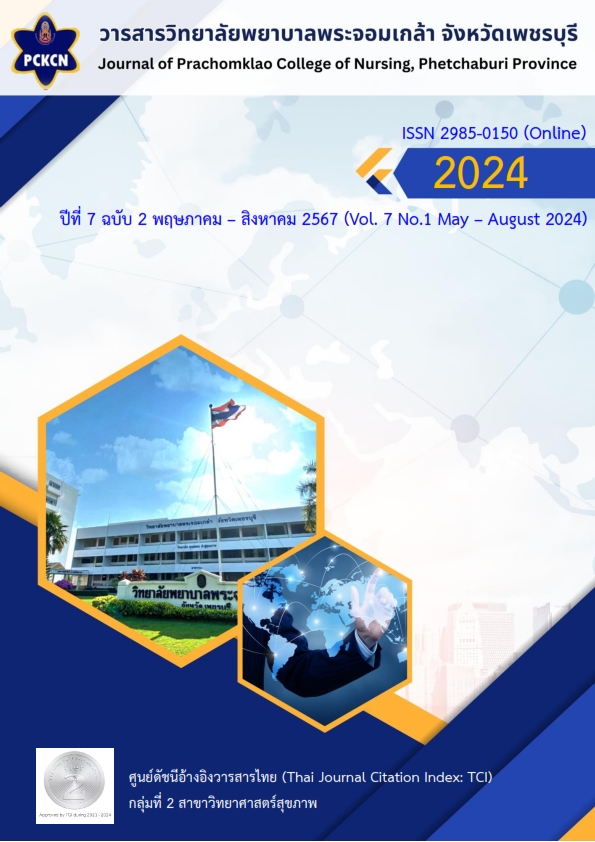ผลของโปรแกรมการจัดการความรู้ต่อพฤติกรรมการให้คำปรึกษา เรื่อง การเลี้ยงทารกด้วยนมมารดาของนักศึกษาพยาบาลศาสตร์ ช่วงหลังของการระบาดทั่วโลกของโรคติดเชื้อไวรัสโคโรนา 2019 ในจังหวัดนครปฐม
Main Article Content
บทคัดย่อ
การวิจัยกึ่งทดลอง แบบสองกลุ่มเปรียบเทียบก่อนและหลังการทดลอง มีวัตถุประสงค์เพื่อศึกษาผลของโปรแกรมการจัดการความรู้ต่อระดับพฤติกรรมพฤติกรรมการให้คำปรึกษาเรื่องการเลี้ยงทารกด้วยนมมารดาของนักศึกษาพยาบาลศาสตร์ ช่วงหลังของการระบาดทั่วโลกของโรคติดเชื้อไวรัสโคโรนา 2019 ในจังหวัดนครปฐม กลุ่มตัวอย่างคือ นักศึกษาพยาบาลศาสตร์ที่เข้าฝึกปฏิบัติในหน่วยบริการด้านการเลี้ยงทารกด้วยนมมารดา จำนวน 70 คน แบ่งเป็นกลุ่มทดลอง และกลุ่มควบคุมกลุ่มละ 35 คน เครื่องมือที่ใช้ในการดำเนินการวิจัย ได้แก่ โปรแกรมการจัดการความรู้ด้านการเลี้ยงทารกด้วยนมมารดา แบบสอบถามข้อมูลทั่วไป และแบบวัดระดับพฤติกรรมการให้คำปรึกษา มีค่าดัชนีความตรงตามเนื้อหา เท่ากับ .86 และหาความเชื่อมั่นโดยหาค่าสัมประสิทธิ์แอลฟาของครอนบาค .96 วิเคราะห์ข้อมูลโดยใช้สถิติเชิงพรรณนาและการทดสอบที ผลการวิจัย พบว่า
1. นักศึกษาพยาบาลศาสตร์กลุ่มทดลอง มีค่าเฉลี่ยพฤติกรรมการให้คำปรึกษาหลังทดลอง (M = 3.63, SD = .67) มากกว่าก่อนทดลอง (M = 2.72, SD = .64) และแตกต่างกันอย่างมีนัยสำคัญทางสถิติ (t = 6.93, p < .001)
2. นักศึกษาพยาบาลศาสตร์ระหว่างกลุ่มทดลอง มีค่าเฉลี่ยพฤติกรรมการให้คำปรึกษาเรื่องการเลี้ยงทารกด้วยนมมารดา ภายหลังใช้โปรแกรมการจัดการความรู้ (M = 3.63, SD = .67) สูงกว่ากลุ่มควบคุม (M = 2.72, SD = .64) และแตกต่างกันอย่างมีนัยสำคัญทางสถิติ (t = 6.92, p < .001)
ผลการวิจัยชี้ให้เห็นว่า โปรแกรมการจัดการความรู้สามารถนำไปพัฒนาพฤติกรรมการให้คำปรึกษาเรื่องการเลี้ยงทารกด้วยนมมารดาของนักศึกษาพยาบาลศาสตร์ได้ และควรมีการจัดกระบวนการเรียนรู้ในเรื่องนี้อย่างต่อเนื่อง
Downloads
Article Details

อนุญาตภายใต้เงื่อนไข Creative Commons Attribution-NonCommercial-NoDerivatives 4.0 International License.
เนื้อหาและข้อมูลที่เผยแพร่ในวารสารวิทยาลัยพยาบาลพระจอมเกล้า จังหวัดเพชรบุรี ถือเป็นข้อคิดเห็นและความรับผิดชอบของผู้นิพนธ์บทความโดยตรง บทความ เนื้อหา ข้อมูล รูปภาพ ฯลฯ ที่ได้รับการเผยแพร่ในวารสารนี้ ถือเป็นลิขสิทธิ์ของวารสารฯ หากบุคคลหรือหน่วยงานใดต้องการนำทั้งหมดหรือส่วนหนึ่งส่วนใดไปเผยแพร่หรือเพื่อกระทำการใด ๆ จะต้องอ้างอิงวิทยาลัยพยาบาลพระจอมเกล้า จังหวัดเพชรบุรี ทุกครั้ง
เอกสารอ้างอิง
Aldalili, A. Y. A., & El.Mahalli, A. A. (2021). Factors associated with exclusive breastfeeding cessation. Journal of Multidisciplinary Healthcare, 14, 239–246. https://doi.org/10.2147/JMDH.S277819
Amatya, S., Corr, T. E., Gandhi, C. K., Glass, K. M., Kresch, M. J., Mujsce, D. J., Oji-Mmuo, C. N., Mola, S. J., Murray, Y. L., Palmer, T. W., Singh, M., Fricchione, A., Arnold, J., Prentice, D., Bridgeman, C. R., Smith, B. M., Gavigan, P. J., Ericson, J. E., Miller, J. R., ... & Kaiser, J. R. (2020). Management of newborns exposed to mothers with confirmed or suspected COVID-19. Journal of Perinatology, 40, 987-996. https://doi.org/10.1038/s41372-020-0695-0
Black, R., McLaughlin, M., & Giles, M. (2020). Women’s experiences of breastfeeding support via social media and its impact on long-term breastfeeding success: A social and cognitive perspective. British Journal of Health Psychology, 25(3), 754–771. https://doi.org/10.1111/bjhp.12451
Rubenstein-Montano, B., Liebowitz, J., Buchwalter, J., McCaw, D., Newman, B., & Rebeck, K. (2001). A systems thinking framework for knowledge management. Decision Support Systems, 31(1), 5-16. https://doi.org/10.1016/S0167-9236(00)00116-0
Chamberlain, D. B. (2017). Family-centered maternity care. Jones & Bartlett Learning.
Corey, G. (2023). Theory & practice of group counseling (10th ed.). Cengage.
Kim, E. S., Min, H. G., Lee, J. Y., Lee, J. Y., & Yi, Y. H. (2024). Development of a protocol for the direct breastfeeding of premature infants in neonatal intensive care units. The Journal of Perinatal & Neonatal Nursing, 38(1), 73-87. https://doi.org/10.1097/JPN.0000000000000791
GOV.WALES: Welsh Government services and information. (2023). Statistics breastfeeding data: 2022 data includes breastfeeding status at birth, 10 days, 6 to 8 weeks, and 6 months by local health board for 2022. https://www.gov.wales/breastfeeding-data-2022-html
Kittikul, P., Singchangchai, P., & Aree, P. (2021). Effects of a knowledge management program on breastfeeding counseling behavior of first-level administrators at a tertiary hospital. Journal of Nursing and Education, 14(3), 47-60. (in Thai)
Lubbe, W., Niela-Vilén, H., Thomson, G., & Botha, E. (2022). Impact of the COVID-19 pandemic on breastfeeding support services and women’s experiences of breastfeeding: A review. International Journal of Women's Health, 14, 1447-1457. https://doi.org/10.2147/IJWH.S342754
Ministry of Public Health. (2016). Benefits of breastfeeding, BPR operational strategy in 2016-2017. Ministry of Public Health. (in Thai)
Nakhon Pathom Hospital. (2022). Annual statistics report 2019-2022. Nakhon Pathom Hospital. (in Thai)
Prasitwattanaseree, P., Sinsuksai, N., Prasopkittikun, T., & Viwatwongkasem, C. (2019). Effectiveness of breastfeeding skills training and support program among first time mothers: A randomized control trial. Pacific Rim International Journal of Nursing Research, 23(3), 258–270.
Salehian, M., & Karimi, F. Z. (2022). A critical appraisal of published randomized controlled trials examining the effects of counseling and educational interventions on exclusive breastfeeding. Journal of Midwifery & Reproductive Health, 10(2), 3186-3197. https://doi.org/10.22038/JMRH.2022.62648.1779
Ngoenthong, P., Kantaruksa, K., & Chaloumsuk, N. (2015). Education provision on breastfeeding among adolescent mothers: A systematic review. Nursing Journal, 42(Suppl November), 57-68. (in Thai)
Ridley, C. R., Mollen, D., & Kelly, S. M. (2011). Counseling competence: Application and implications of a model. The Counseling Psychologist, 39(6), 865-886. https://doi.org/10.1177/0011000010378443
Trotzer, J. P. (2013). Counselor and the group: Integrating theory, training, and practice. Taylor & Francis.
United Nations International Children’s Emergency Fund. (2014). Global nutrition report 2014: Actions and accountability to accelerate the world's progress on nutrition. UNICEF.
Wongphinit, U., & Apartsakun, P. (2020). The relationship of knowledge, attitude, and practice for breastfeeding promotion among nursing students, The Thai Red Cross College of Nursing. The Thai Red Cross College of Nursing, 11(1), 68-84. (in Thai)
World Breastfeeding Trends Initiative: WBTi. (2019). WBTi report: The status of breastfeeding in countries worldwide. World Breastfeeding Trends Initiative.
World Health Organization. (2020). Infant feeding in the context of COVID-19: Guidance for health professionals. World Health Organization.


